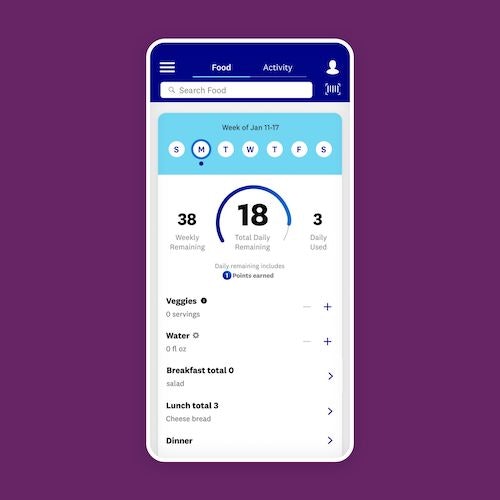- How Weight Watchers Works
- Success Rate of WW
- Is Weight Watchers Legit? What the Reviews Say
- Pros and Cons of WW
Weight Watchers is a popular weight management program founded in the early 1960s by Queens woman Jean Nidetch. It has evolved from a purely dieting model to a lifestyle program, looking at mental, physical, and emotional health as contributors to a healthy lifestyle. Now known as WW, the program prides itself on promoting long-term weight management through a healthy lifestyle versus fad dieting or short-term solutions. But does Weight Watchers work?
How Weight Watchers Works
The Weight Watchers program is subscription-based, with plans offering different tools and support, such as:
- Community support groups
- The PersonalPoints Program
- In-person and virtual workshops
- A dedicated WW Coach
The program has evolved over the years and is now predominantly based on a points system—the PersonalPoints Program.
PersonalPoints Program
The WW PersonalPoints Program (daily smart points) is designed to take the hassle out (some of it, at least) of eating healthy. It’s like counting calories, but more tailored to your eating habits and weight loss goals, and easier to track.
Healthy Foods Are Encouraged
The PersonalPoints program allows you to eat more fruits and vegetables and lean proteins, designating lower points (or even zero points) to these foods.
When you first sign up for WW, you’ll be asked a series of questions about your goals, what foods you like, what your current eating habits are like, and others. Based on your responses, WW assigns you a personalized digital plan that gives you:
- A points budget (food that you eat will be allocated points, and you use up your daily points budget when you eat)
- A list of ZeroPoint foods (foods that won’t use up any of your points budget)
- An activity target (to incorporate exercise into your healthy lifestyle plan)
WW states that those on the program can expect to lose 1-2lbs each week.

Cost of WW Plans
WW plans aren’t free. The standard monthly fee is $21.95, which may seem steep for a food tracking app, but with more than 4.5 million members worldwide, there has got to be some legitimacy to it.
Get a Discount on Membership
Weight Watchers regularly offers membership discounts, sometimes discounting your program for 6 months or waiving the Starter Fee ($20 savings). If you don’t see a discount on the WW website, check social media—they may have promotions running to save you money.
Success Rate of WW
There is no accurate number of people who have successfully lost weight on the WW program. That would require honest results from everyone who has followed the program (assuming the program is followed correctly by all), which is difficult to obtain.
One particular study on the Weight Watchers program showed:
- An average weight loss of 3.1% of initial body weight after 12 meetings.
- A third of those in the study lost 5% or more of their initial body weight.
- Only 54% of people in the study completed the Weight Watchers course.
- 57% of those who completed the program lost 5% or more of their initial weight.
Note that this study was on the older Weight Watchers plan that was active between 2007 and 2009.
No Huge Difference Between 3 Months and 12 Months
A different study found that the WW online program produced similar weight loss results for participants at 3 months and 12 months—showing that there may not be long-term weight loss results. However, it may prove that WW helps participants avoid gaining weight they already lost.
Is Weight Watchers Legit? What the Reviews Say
There are plenty of reviews out there from WW members, but we searched for non-biased reviewers from trusted publications such as Forbes and USA Today. Here are their results.
| Publication | Weight Loss | Period |
| Forbes Health | 5lbs | 4 weeks |
| USA Today | 30lbs | 1 year |
| Business Insider | 60lbs | 1 year |
| Better by Today (NBC News) | 3lbs | 1 month |
According to US News & World Report, the WW diet is ranked the 5th Best Diet Overall for 2022, behind the:
- Mediterranean diet
- DASH diet
- Flexitarian diet
- MIND diet
Tying in 5th place with the:
- Mayo Clinic diet
- TLC diet
- Volumetrics diet
Is Weight Watchers Legit? How It's Ranked Out of 5
| Category | US News & World Report Score | Healthline Score |
| Overall | 3.7 | 3.73 |
| Weight loss | Long-term: 3.3 Short-term: 3.7 |
4.5 |
| Nutrition | 4.5 | 4 |
| Sustainability | n/a | 2.7 |
| Ease of following | 3.3 | n/a |
| Safety/healthy eating | 4.4 | 4.7 |
| Whole-body health | n/a | 2.5 |
| Evidence-based | n/a | 4 |
Over 600 reviews on Consumer Affairs have WW ranked 3.9 out of 5 stars out, with most reviews rating the weight loss plan at 4 out of 5.
Pros and Cons of WW
With most (if not all) weight loss programs, there are benefits and downsides, and these vary from person to person.
Pros of WW
- Allows “free” foods (less restrictive than other diets)
- Focuses on physical activity and mental health also
- Promotes slow and steady weight loss (vs. an unhealthy loss)
- Huge community to tap into for additional support
- Allows for more flexibility in food choices
- Focuses on healthy eating
- There are WW ready-made meals, making meal planning easier
Cons of WW
- Tracking foods eaten can be difficult and tedious
- Monthly subscription fee is not affordable for everyone
- May offer too much freedom for some people, resulting in unhealthy habits (some people may start skipping meals to save up points)
- May not be that effective for long-term weight loss
- There is a risk of regaining lost weight after ending the program
- Coaches are not necessarily medical professionals


Comments